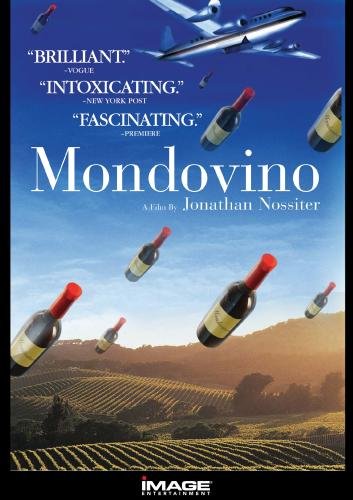***½/**** Image A- Sound A Extras A-
directed by Jonathan Nossiter
by Travis Mackenzie Hoover
"I like order, but I also like disorder."
-Hubert de Montille, Mondovino
Like a lot of people unconnected to the better households, I always viewed the obsessive discernment of wine lovers with a dash of incredulity. Cultivating taste in the arts, now that seemed to make sense: it was where the beliefs of a culture were stored, where competing values duked it out for the right to call themselves a representation of reality. But wine? The other grape juice? Something didn't jibe–which made me nervous about approaching Jonathan Nossiter's Mondovino. Yet the film's subject isn't really wine at all: this is a tract on how globalization is sucking local identity and individual quirk out of everything it touches. The subject could be art or food or, dare I say it, film. It's a preview of what we're going to be stuck with, and a message to those atomized in their fields that things are tough all over.
Nossiter more or less begins his treatise with the example of the French town of Aniane and its non-corporate vineyards, which are poised for takeover by Californian mega-winery Mondavi. In a much-publicized battle, a newly-elected Communist mayor helped the local producers protect their land from the encroaching Goliath–but before we can celebrate, we're introduced to famed consultant Michel Rolland. Swept into power in the '80s, he's been preaching the gospel of "micro-oxidization," an artificial aging process that runs counter to the centuries-old traditions of terroir, i.e. the characteristics of a vineyard that lend a wine its distinctive flavour. When Rolland touches a wine, it becomes homogenized and vulgar–and, perhaps not surprisingly, extremely popular.
The program should ring familiar to those of us clinging to diversity in cinema. There are the superproducers like Mondavi and Mouton-Rothschild, who use their considerable capital to stomp independents into the ground; and then there are the so-called critics, like Robert Parker and WINE SPECTATOR, who abet the dumbing-down process. I'd call Parker the Roger Ebert of wine, except that producers don't tremble at the thought of Ebert and illegally alter their product in order to win his approval. Parker is such a towering figure that to lose his support is to kiss one's livelihood goodbye. Here, he blithely attributes his support for Rolland's hocus-pocus to "American democracy," even as his considerable influence makes it impossible for people to actually choose beyond the major labels.
I am, of course, taking all of this on Nossiter's word. I don't know a Montpellier from a Miller Lite, so there is the off chance that micro-oxidization is the manna from which wine divinity must spring. Somehow, though, I doubt it: the patterns are too similar to what most of us face. Globalization isn't confined to particular economic/cultural arenas, it's the air that we breathe and it impacts everything we do. To depict one arena's struggle is to mirror the rest, as well as to suggest that our lives could be richer and less circumscribed if we started resisting the trends.
When Nossiter trots out someone he actually respects, it's someone like holdout Hubert de Montille. A bit of a hardass, Montille is unsentimentally critical of his children in the trade, but he's also passionate about a point of view beyond earning money and wielding power. Where Parker is sweetly maudlin and Rolland is a raucous joker (the better to get his vampire self invited in), Montille is completely uninterested in ingratiating himself–he wants to make wine, his way, and respects the right of others to do the same. It's a personality type we could use more of nowadays. As I see the citadel of film culture eroded by media mergers and accusations of elitism, it's nice to know that somebody stands for human values rather than corporate ones and sees his life's work as something that stretches beyond his person into the place in which it exists.
THE DVDTH!NKFilm ushers Mondovino to disc in style. The 1.78:1, 16×9-enhanced image is surprisingly sharp for something transferred from DV to film (and back again): colours are reasonably subtle and fine detail is unusually good under the circumstances. The Dolby 2.0 stereo sound is also remarkably powerful, with just some slight muffling costing it top marks. Extras include a feature-length commentary with Nossiter; though the man is ever-so-slightly pretentious (observing the dogs that are a recurrent motif, he ponders renaming the film In Cane Veritas), he's also way more on issue than most commentators, noting both his methods (letting the subject decide where and how they'd be shot; space issues) and the sometimes-apoplectic reactions of his subjects to the finished product. It's an unusually useful yak-track that single-handedly redeems the form. Also on board is part six of a ten-part extended Mondovino (52 mins.), which is even more sprawling and rambling than the main event. If it stumbles by cutting to a real plastic surgeon when importer Neal Rosenthal calls a process "plastic surgery," it's nevertheless as alarming and sad as the movie proper. Issues covered include new oak barrels and "vanilla-ization," in addition to the lawsuit Montille served Parker for "accidentally" insinuating that wine he was served was not wine that hit the market. A little fuzzy, but it'll whet your palette for the full series.
135 minutes; PG-13; 1.78:1 (16×9-enhanced); English DD 2.0 (Stereo); DVD-9; Region One; TH!NKFilm




![Countess Dracula (1971)/The Vampire Lovers (1970) [Midnite Movies Double Feature] - DVD|The Vampire Lovers (1970) - Blu-ray Disc 6a0168ea36d6b2970c017c3811fd79970b-800wi](https://i0.wp.com/filmfreakcentral.net/wp-content/uploads/6a0168ea36d6b2970c017c3811fd79970b-800wi.jpg?resize=150%2C150&ssl=1)